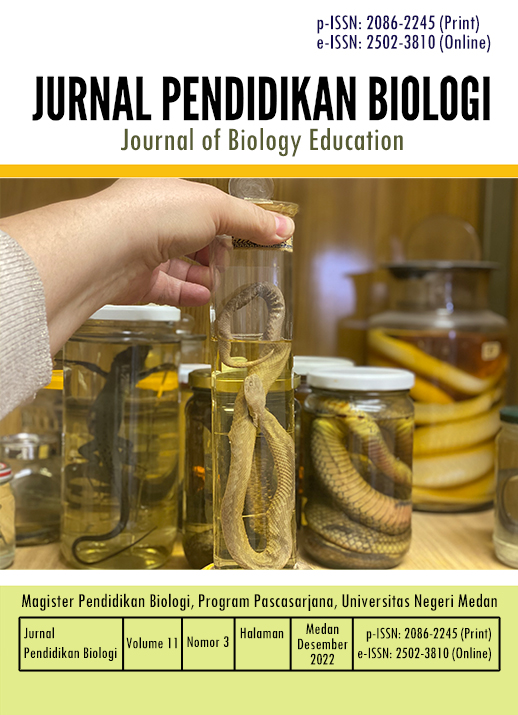Students' Communication Skills Through the Application of Learning Management System Schoology on Environmental Change Materials
DOI:
https://doi.org/10.24114/jpb.v11i3.37598Keywords:
Communication Skills, Learning Management System SchoologyAbstract
Communication is one of the skills that play an important role in the scope of life. Especially in the world of education, the ability to communicate can be improved through learning with innovative media delivered by teachers during teaching and learning activities. In supporting learning, one of the sophisticated digital media that is easily accessible is the learning management system Schoology. The purpose of this research is to find out the improvement of students' communication skills on the material of environmental change in senior high school through the application of the learning management system Schoology. Learning Management System Schoology is a site that combines the features of social networking and LMS. The method used is pre-experimental in the form of one group Pretest-Posttest design and the sampling technique is purposive sampling. The subjects in this study were students of class X MIPA 7 at SMAN 1 Palimanan, totaling 30 people. Based on the results of the calculation of N-gaincalculation it is known that this study has a significant developmental impact. The results showed an increase in students' communication skills by 16.92%. The average value of the Pretest is 65 which is included in the "Enough" category and increased in the Posttest with a value of 76 which is included in the "Good" category. Thus, it can be concluded that there is an increase in students' communication skills through the application of Learning management system Schoology on environmental change material in senior high school.References
Astuti, Waluya, S. B., & Asikin, M. (2019). Strategi Pembelajan Dalam Menghadapi Tantangan Era Revolusi 4.0. Seminar Nasional Pascasarjana 2019, 2(1), 469“473. https://proceeding.unnes.ac.id/index.php/snpasca/article/view/327
Garcia, L. F., Sebastian, A. s, Garcia, N. M., & Colomina, S. S. (2018). Schoology As an Alternative To Traditional Teaching Tools for University Students. EDULEARN18 Proceedings, 1(July), 7514“7520. https://doi.org/10.21125/edulearn.2018.1754
Hasanah, F. (2021). ANALISIS KETERAMPILAN KOMUNIKASI ILMIAH SISWA PADA PEMBELAJARAN BIOLOGI SMA DI MASA PANDEMIK COVID-19 Skripsi. In Skripsi.
Hernani, L., Oka, A. A., & Asih, T. (2019). Peningkatan Nilai Kognitif Biologi Menggunakan Model Blanded Learning Berbasis Schoology Peserta Didik Kelas X4 Ipa Sma N 4 Metro Tahun Pelajaran 2018/2019. In BIOEDUKASI (Jurnal Pendidikan Biologi). 10(2). https://doi.org/10.24127/bioedukasi.v10i2.2486
Irawan, V. T., Sutadji, E., & Widiyanti. (2017). Blended learning based on Schoology: Effort of improvement learning outcome and practicum chance in vocational high school. Cogent Education, 4(1). https://doi.org/10.1080/2331186X.2017.1282031
Levy, O. S., Eylon, B.-S., & Scherz, Z. (2009). Teaching Scientific communication skills in science studies: does it make a difference?
Pritasari, A. C., Jannah, A. N., & Puspitasari, A. D. (2021). Schoology as the e-learning system for the Covid-19 pandemic period. CITRA (Internasioal Journal Of Community Service, Informatics, Technology,Research in Education, Art and Humasnities), 1(1), 13“27.
Purnamawati, H. (2021). Mengembangkan Keterampilan Komunikasi dan Kolaborasi Melalui Pembelajaran Aktif dengan Pendekatan MIKiR. Jurnal Ilmiah Universitas Batanghari Jambi, 21(2), 664. https://doi.org/10.33087/jiubj.v21i2.1521
Redi, P. (2018). Pengantar Studi (Ilmu) Komunikasi, Komunikasi Sebagai Kegiatan Komunikasi Sebagai Ilmu. Jakarta: Prenada Media. Prenadamedia Group.
Salmia, A. . Y. (2021). Peran Guru dalam Pembelajaran Abad 21 di Masa Pandemik Covid-19. Indonesian Journal of Primary Education, 5(1), 82“92. http://ejournal.upi.edu/index.php/
Septikasari, R., & Frasandy, R. (2018). Keterampilan 4C Abad 21 Dalam Pembelajaran Pendidikan Dasar. Jurnal Tarbiyah Al Awlad, VIII, 107“117.
Sicat, A. S. (2015). Enhancing College Students™ Proficiency in Business Writing Via Schoology. International Journal of Education and Research, 3(1), 159“178.
Sriyanto, W., & Kaniadewi, N. (2019). Using Schoology in the Era of IR 4.0 (Factors Analysis From Students™ Perception). International Journal for Educational and Vocational Studies, 1(5), 451“454. https://doi.org/10.29103/ijevs.v1i5.1573
Sugiyono. (2019). Metode Penelitian Kuantitatif, Kualitatif, dan R&D. Alfabeta.
Turiman, P., Siti, T., Tengku, M., & Osman, K. (2019). 6431-16940-1-Pb. 9(1), 46“53.
Utari, T. S. G. (2021). Inovasi Pendidikan. Prisma Press.
Downloads
Published
Issue
Section
License
Copyright (c) 2022 Jurnal Pendidikan Biologi

This work is licensed under a Creative Commons Attribution 4.0 International License.
Copyright
Penyerahan naskah menyiratkan bahwa karya yang diserahkan belum pernah diterbitkan sebelumnya (kecuali sebagai bagian dari tesis, laporan, atau abstrak). Naskah tidak dipertimbangkan untuk publikasi di tempat lain. Penerbitannya telah disetujui oleh semua penulis bersama. Jika dan kapan naskah diterima untuk publikasi, penulis masih memegang hak cipta dan mempertahankan hak penerbitan tanpa batasan. Penulis atau orang lain diperbolehkan untuk melipatgandakan artikel selama tidak untuk tujuan komersial. Untuk penemuan baru, penulis disarankan untuk mengelola patennya sebelum diterbitkan.
Open Access
Jurnal ini berkomitmen untuk membuka akses bebas yang tidak membebankan biaya kepada pembacanya atau lembaga mereka. Pembaca berhak membaca, mengunduh, menyalin, mendistribusikan, mencetak, mencari, atau menautkan ke teks lengkap artikel, selama tidak untuk tujuan komersial. Jenis lisensi adalah CC-BY-4.0.
Disclaimer
Tidak ada tanggung jawab yang dikenakan kepada Penerbit atau oleh editor untuk kesalahan dan/atau kerusakan pada naskah sebagai akibat dari pernyataan pencemaran nama baik atau dugaan pencemaran nama baik, pelanggaran hak kekayaan intelektual atau privasi, atau kewajiban produk, baik akibat kelalaian atau sebaliknya, atau dari penggunaan atau operasi ide, instruksi, prosedur, produk atau metode apa pun yang terkandung dalam materi di dalamnya.

